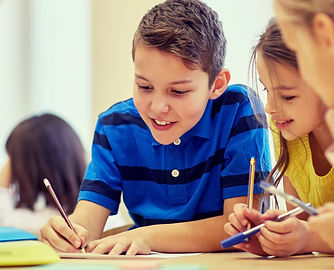
Call us today! 732-639-1551

Social Skills Groups
We now offer fun, effective therapeutic
social skills groups led by our experienced
Speech-Language Pathologists!
Our groups are appropriate for children ages 3 and up, and they are organized by age. During groups, we will target various age-appropriate social skills, including but not limited to taking turns, waiting, personal space, conversational skills, perspective-taking, losing/winning gracefully, and expected/unexpected behaviors. Lessons will be tailored to the needs of the group.
Using a proprietary blend of Social Thinking® concepts and materials along with other evidenced-based approaches, we will assist your child in meeting social communication milestones that will support their ability to learn in a group environment and maintain relationships with the peers and adults in their lives.
Groups will occur weekly in our spacious, kid-friendly sensory gym. We will incorporate movement into every session to keep our attendees engaged. Join us for fun-filled learning experiences!
The Inherent Benefits of Group Therapy
Group therapy offers a unique opportunity for your child to target classroom skills in a smaller setting with knowledgeable, patient professionals. Skills such as turn-taking, waiting, peer interaction, and following directions are targeted incidentally in a group setting, in addition to the goals your child will work towards. Children look forward to social group week after week and view it more as a play group than therapy. Wondering if your child can benefit? See below to see if they are on target with their social communication development.

Social Communication
Milestones
3–4 Years
-
engages in longer dialogues
-
anticipates next turn at talking
-
terminates conversation; appropriately role-plays
-
uses fillers—such as “yeah” and “okay”— to acknowledge a partner’s message
-
begins code-switching and uses simpler language when talking to very young children
-
uses more elliptical responses, such as “Mommy went home, I didn’t”
-
requests permission
-
begins using language for fantasies, jokes, and teasing
-
makes conversational repairs when not understood and corrects others
-
infers information from a story and infers indirect meanings
-
uses primitive narratives—events follow from the central core
-
uses inferences in stories
4–5 Years
-
uses indirect requests; correctly uses deictic terms (e.g., this, that, here, there)
-
uses twice as many effective utterances as 3-year-olds to discuss emotions and feelings
-
uses narrative development characterized by unfocused chains—stories have a sequence of events but no central character or theme
-
develops basic understanding of theory of mind, including judgment that another person may have a belief that differs from the truth
-
shifts topics rapidly
-
shows fantasy schemes in play
-
understands that beliefs can result in predictable emotions
-
understands that someone may feel the same way when experiencing a similar event
-
uses co-missives/promises
School-Age Years (6–12 Years)
-
demonstrates increased understanding of theory of mind (predicting what one person is thinking about what another person is thinking or feeling; understands strategies to hide deceit, recognizes sarcasm)
-
provides assistance and demonstrates altruism
-
uses narrative development characterized by causally sequenced events using “story grammar”
-
demonstrates improved conversational skills (e.g., topic maintenance, repair, and increased number of turns)
-
extends topic of conversation
-
demonstrates refined social conventions
-
demonstrates metapragmatic skills—child is able to think about social and conversational rules
-
uses language for varied functions, including persuading and advancing one’s opinion
-
understands that people can feel multiple emotions at the same time
-
practices increased self-regulation
-
uses indirect requests
-
uses inferential language
-
uses ambiguous language (figurative)
-
uses sarcasm
-
uses double meanings (puns)
Older Adolescence Into Adulthood
-
uses verbal and nonverbal language competently and flexibly
-
navigates multiple registers flexibly and fluidly
-
demonstrates refined understanding and use of nonverbal behavior
-
can explain idioms and nuanced figurative language
-
develops close friendships and romantic relationships
-
continues to develop empathy
(Reference: American Speech Language Hearing Association https://www.asha.org/practice-portal/clinical-topics/social-communication-disorder/social-communication-benchmarks/
Group Specifics
-
Who leads the groups?
Social Skills groups are facilitated by a licensed speech-language pathologist and a therapy aide.
-
Can I use my insurance?
Yes, however, coverage is at the out-of-network level and submitting for reimbursement is your responsibility. We are happy to provide paid invoices as needed.
-
What is the cost?
We require a 6-week commitment and the cost is $300.
-
How long are groups?
Groups are 45 minutes each and will occur on the same day/time every week.
-
What is the group size?
We maintain the integrity of our groups with a low student to staff ratio. Groups consist of a maximum of six children.
-
How do I register my child?
Call 732-639-1551 or email us info@littlebirdsspeechtherapy.com to join the fun!